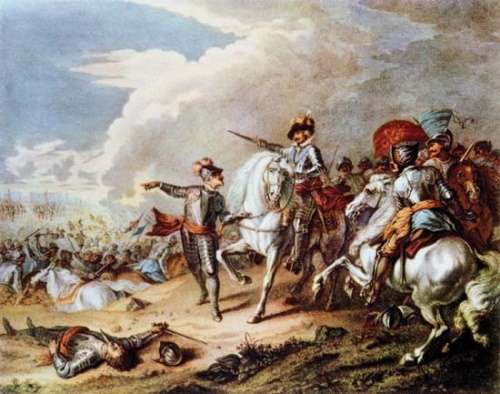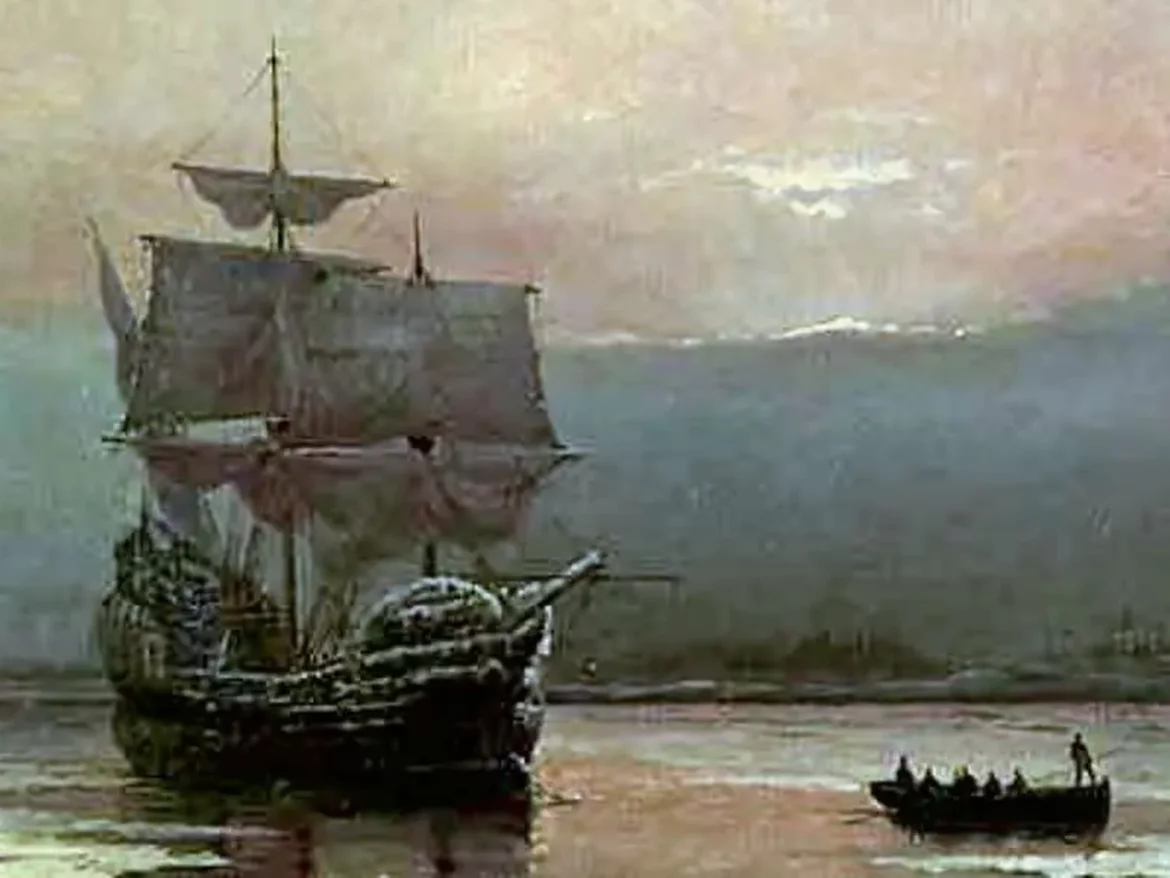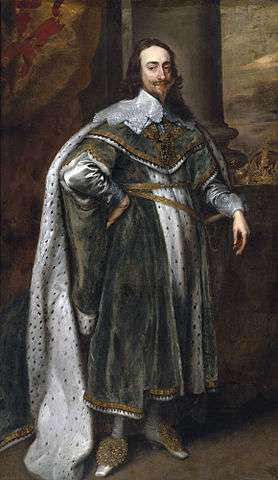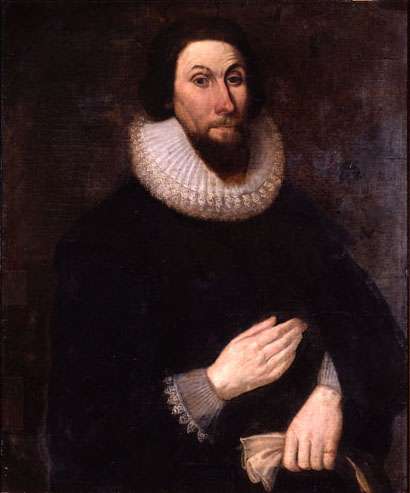When the Pilgrims landed in Plimoth Plantation in 1620, they began what was called the Great Migration – great not because of the numbers of people who arrived, but because of the Puritans’ purpose.
They came to America to live righteous and spiritual lives, rather than to get rich. And they didn’t let just anyone join their movement.
Most of the Puritans who came to New England came from prosperous middle-class families. They differed from the poor, single male immigrants who dominated immigration to other regions of America. They had skills and they could read, unlike the immigrants to Virginia, 75 percent of whom were servants.
The Puritans actually left stable economic lives in a corrupt England for a land where they could build a City Upon a Hill. And yet their future was far from certain.
‘Great Giddiness’ To Leave England
The Pilgrims weren’t the first Europeans to populate New England, not by a long shot. Fishermen and fur traders from France, the Netherlands and Spain set up summer settlements along the coast since the early 16th century.
Anglican English, too, tried to settle New England. Many worked for the Council of New England, a joint stock company set up by Sir Fernando Gorges and 40 friends. Gorges intended to create an aristocratic Anglican colony living off fish and furs. It failed, and the Massachusetts Bay Company took over the charter.
The Pilgrims of Plymouth Colony had the most extreme beliefs of the Puritan sect. They wanted complete separation from the corrupt Anglican church. More moderate Puritans only sought to purify and reform the Church of England.
King Charles I gave the Great Migration an impetus when he dissolved Parliament in 1629 and began the Eleven Years’ Tyranny. Charles, a high Anglican, embraced religious spectacle and persecuted Puritans.
The Puritans knew the Plymouth Colony experiment worked, and decided to replicate it. The Great Migration began to take off in 1630 when John Winthrop led a fleet of 11 ships to Massachusetts. Winthrop brought 800 people with him to New England; 20,000 followed him over the next 10 years.
Emigration Rage
The Massachusetts Bay Company found willing recruits. Marcus Lee Hansen in The Atlantic Migration 1607-1860 wrote that the company had no trouble finding congregational groups willing to make the Great Migration. Nor did the groups have any trouble recruiting members.
A rage of emigration swept through the eastern and midland counties of England, arousing in the authorities an apprehension which was to be shared by many other local officials of Europe during the next two and a half centuries. The popular interest anticipated most of the features appearing in later periods. The ballad, “Summons to New England,” was sung on the streets; a “great giddiness” to depart prevailed; “incredible numbers’ sold their lands; and debtors attempted to get away under the pretext of religion.
Emigration fever spread beyond southern England. When John Winthrop, Jr., in 1635 traveled through Ireland, Scotland and the north of England, he found that the contagion preceded him.
“Everywhere he stopped, eager inquirers sought him out,” Hansen wrote.
Great Migration
The Puritans discriminated against people who wanted to settle with them. Magistrates scrutinized each arriving immigrant. They sent some back to England as “persons unmeete to inhabit here.” The governor could put anyone on a month’s probation who wasn’t fit ‘to sit down among us without some trial of them.’
In 1633 and 1634, the Puritans declared thanksgiving for the harvest and for the ships that brought “persons of spetial use and quality.”
The Second Wave
Immigrants who had less property and weaker religious convictions than the early wave began to arrive.
The Massachusetts Puritans passed a law forbidding a person or town to entertain guests for more than three weeks without special permission. In Rhode Island, Providence and Portsmouth required a town vote to let a newcomer stay. New Haven appointed a committee to evaluate landless strangers — and a whipping before it sent them out of town.
Once the immigrants arrived, they’d spend a few weeks or the winter in their port of entry. Then they typically fanned out to new towns. If they arrived early enough in a new town to become proprietors, they would share in the distribution of land. Towns limited the number of proprietors to make sure their children had viable economic futures.
When a town reached its limit, the proprietors closed it. Within the first 10 years of settlement, the Puritans closed 22 towns from Maine to Rhode Island. But plenty of frontier land beckoned from the interior.

The Battle of Naseby, 1645. Turning point in the English Civil War.
All that ended when the English Civil War broke out in 1640. The great migration stopped. Some settlers had already returned because life was too harsh in the howling wilderness, and some settlers returned to England to fight the war. In fact, more Puritans left New England that year than arrived.
But the population of New England grew anyway. The Puritans lived long lives and formed large, healthy families. When the first U.S. census was taken in 1790, New England had a population of 1,009,522.
With thanks to GreatMigration.org and The Atlantic Migration 1607-1860 by Marcus Lee Hansen. This story about the Great Migration was updated in 2024.





87 comments
Janet Vincent
Betty LaCasse,this is about the time your family came over from england
[…] a problem except Mary took up with a man named John Britton. Britton was a professor in England who came to the Colonies, but he was not a […]
[…] site, anchored in Plymouth Harbor for 110 days as the settlers did their best to establish a toe-hold in New […]
[…] Edmund Greenleaf and Sarah Moore. She emigrated to Massachusetts with her family in 1634 during the Great Migration of Puritans. Her father, a silk dyer and tavern keeper, was one of the founders of Newbury. In 1644, when she […]
[…] were coming to America then with the uneasy blessing of the Massachusetts Puritans, who viewed them as another persecuted religious minority. The Puritans also thought the newcomers […]
[…] the rear of the general store in the small village of Plymouth Notch on July 4, 1872. He came from old Puritan stock, and his family had deep roots in New England politics and farming. (You can watch him wield a […]
[…] neighbors. East Anglia was the birthplace of many Puritans who came to Massachusetts Bay during the Great Migration of 1620 to 1640. It was a wealthy center of cloth manufacturing with thriving ports of Boston, Great Yarmouth, […]
[…] create their moral community – their ‘city on a hill’ – the Puritans had left their homes, sailed across the Atlantic and confronted the terrors of the […]
[…] the Puritans, fasting was a way to assuage God’s wrath. The purpose of fasting was to imbue people with a […]
[…] Danforth was born October 17, 1626 in Framingham, England, and migrated with his father and five siblings to Massachusetts Bay Colony in 1634. He studied astronomy at Harvard College. After graduation in […]
[…] The village was the home of Waban, one of the first Indians converted to Christianity by the Puritan minister John […]
[…] would battle the Puritans over the next two decades using his wit, his pen, his political connections and his legal […]
[…] only fitting the word game took root in New England, where the Puritans brought with them the highest level of literacy in the North American […]
[…] New England Christmas started out as an ordinary work day for Puritans who frowned on the papist revelry of their Anglican neighbors. Over the years it evolved, with the […]
[…] was born Dec. 26, 1837, in East Haddam, Conn., a Mayflower descendant and scion of a wealthy family. When he was eight years old his father, Eliphalet […]
[…] Day, when Christians celebrate the Feast of the Annunciation of the Blessed Virgin. So in 1620, John Winthrop's father Adam wrote in his diary, "The new year beginneth," on March […]
[…] the book John Winthrop carried across the Atlantic, Allestree’s Almanacke for 1620, his father had written such entries […]
[…] age 54, she pulled up stakes and sailed for America. She first settled in Saugus, and was granted 400 acres for a plantation. Shortly, however, she […]
[…] Day began with the Puritans as a jolly secular holiday. The colonists traveled to town in spring or early summer to elect their […]
[…] already here was perhaps unavoidable, though it wasn’t the goal of the Pilgrims when they crossed the Atlantic. But then Mad Jack Oldham changed […]
[…] revealed the puritanical contempt for comfort so much as the absence of a meetinghouse stove. The Puritans believed their religious zeal could warm them in unheated buildings, even in freezing New England […]
[…] Not much is known about his early life. He was born Jan. 22, 1645 (Old Style), in Dundee, Scotland. His father was a seaman lost at sea, though some claim he was a Puritan minister. […]
[…] differed from the New England Congregationalists, or Puritans, who believed the 'elect' were saved and the 'unregenerate' weren't, Universalists believed in […]
[…] Puritans already had trouble with the Baptists, but their differences were minor compared to the Quakers. […]
[…] Puritans already had trouble with the Baptists, but their differences were minor compared to the Quakers. […]
[…] Puritans already had trouble with the Baptists, but their differences were minor compared to the Quakers. […]
[…] Puritans already had trouble with the Baptists, but their differences were minor compared to the Quakers. […]
[…] later) scouted the New World with about 70 others who sailed aboard the Abigail in 1628, during the Great Migration of Puritans began. He established a small settlement and called it ‘Salem,’ the Hebrew word for […]
[…] Puritans had stills in their homes to make rum for medicinal purposes and to offer to guests, according to […]
[…] before that, the Puritans of Massachusetts Bay Colony tried to explain what caused the trial and execution of 20 alleged […]
[…] John Winthrop and other members of the Massachusetts Bay Colony first settled in Boston in 1630, they soon discovered in the back woods an English nobleman was in residence – Sir Christopher […]
[…] the Puritans of the Massachusetts Bay Colony of Boston gained ascendance, they had plenty of disagreements with the Pilgrims in Plymouth. But they were largely united in […]
[…] was still aboard the Arbella when he delivered his sermon, in which he listed the qualities he hoped the Puritan colonists would […]
[…] Fundamental Orders was an extraordinary document written by Roger Ludlow, a lawyer who had sailed to the Massachusetts Bay Colony from England in 1630. Nowhere did it mention a king or a sovereign. Nowhere did it refer to any […]
[…] Elizabeth Poole left England on April 22, 1637 on the Speedwell with two friends, 14 servants, goods and 20 tons of salt. William and his family were probably already there. Another sister married the Rev. Nicholas Street, one of the first ministers in Taunton. […]
[…] Latin was established by the early Puritans, who believed strongly in educating boys and girls so they could read the Bible. It became a […]
[…] New Hampshire accent started with the English colonists who first arrived in North America. They brought with them speech patterns from Elizabethan London and part rural speech from […]
[…] Downing was John Winthrop’s nephew, a member of Harvard’s first graduating class and a soldier supporting Oliver Cromwell’s […]
[…] from Anne Bradstreet, a Puritan mother of eight who sailed to New England as a young wife on the Arbella in 1630. She wasn’t always the perfect Puritan mother: She wrote poems, mourned the death of her […]
[…] Mather, born in 1639, was so named in the midst of the Great Migration of Puritans. “Increase” meant "…the never-to-be-forgotten increase, of every sort, wherewith God favored […]
[…] in 1638, Lucy Downing and her family sailed to the Massachusetts Bay Colony on the Thomas and Francis so they could lead spiritual and righteous […]
[…] was great-grandson of the John Winthrop who founded Massachusetts Bay Colony. He was also grandson of Connecticut Gov. John Winthrop, who […]
[…] 1635. They were among 100 passengers on the James, one of five ships carrying Puritans during the Great Migration. Three smaller ships on the journey crossed quickly and landed […]
[…] their rigid enforcement of community standards, Puritan New Englanders often resorted to unusual punishments such as the bilbo, the cleft stick, the brand, the ear crop […]
[…] Richard Sears and Eleonora Randolph Coolidge Sears. Her ancestors included Thomas Jefferson, John Winthrop and Massachusetts Gov. James Sullivan. She was Henry Cabot Lodge’s […]
[…] Russell Lowell was descended from Percival Lowell, who had come to America in the Great Puritan Migration. His uncle James Russell Lowell was a famous poet. Lowell, Mass., was named for his great-uncle, […]
[…] born Mary Reeve, daughter of Thomas Reeve and Hannah Rowe Reeve, in England around 1624. The family migrated to Springfield in the Massachusetts Bay Colony, and Mary married William Webster in 1670. He was 53 and she was […]
[…] Plymouth Colony was settled in 1620 by Anglicans and Separatists, also known as Brownists, and later known together as the Pilgrims. The Pilgrims believed democracy was the form of government required by God — and that government should enforce religious belief. […]
Is England a city?
[…] nine children. Together they ‘braved the dangers of the sea’ to come to Massachusetts in the Great Puritan Migration. He started a glassmaking business in Salem, but moved to Rehoboth in Plymouth Colony. There he led […]
[…] the beaches of Narragansett the pacers were raced. While Puritan Massachusetts frowned on sporting events such as racing, the more liberal Rhode Island allowed it. […]
[…] as soon as the Salem witch hysteria subsided, the Puritans of Massachusetts Bay Colony tried to justify killing 20 people. The Rev. Cotton Mather explained […]
[…] Vaughan didn’t leave much in the way of paper records, but he did change the face of Puritan New England with dozens of striking and much-admired Gothic Revival churches, schools and […]
[…] great-great-grandfather Henry Adams had come to Massachusetts in 1630 as part of the Great Migration of Puritans from […]
[…] great-great-grandfather Henry Adams had come to Massachusetts in 1630 as part of the Great Migration of Puritans from […]
[…] the arrival of the Winthrop fleet in 1630, Massachusetts had steadily grown in size and in wealth. With an organized government, its citizens […]
[…] played such an important role in any feast that some 17th-century Puritan ministers denounced them from the pulpit. They preached that Thanksgivings should be renamed ‘St. […]
[…] Susannah Johnson was born Feb. 20, 1729 or 1730, in Lunenberg, Mass., one of 12 children to Moses and Susanna Hastings Willard. She was descended from Maj. Simon Willard, who founded Concord, Mass., and Thomas Hastings, who immigrated to America in the Puritan Great Migration. […]
[…] One of those rooms had shelves full of board games, relatively new in Puritan Massachusetts. […]
[…] Day, when Christians celebrate the Feast of the Annunciation of the Blessed Virgin. So in 1620, John Winthrop's father Adam wrote in his diary, "The new year beginneth," on March […]
[…] Winthrop famously wrote in this journal that the Arbella departed for the New World on Easter Monday – March 29, 1630. But the Puritan Easter would soon […]
[…] breweries sprang up in Boston shortly after the Puritans arrived. Soon the General Court regulated the price of beer at 2-1/2 cents per […]
[…] College pranks have been part of the college experience since at least the 13th century, when Oxford students sent a prostitute to the cardinal in residence. The tradition of college pranks came to North America with the Puritans. […]
[…] would battle the Puritans over the next two decades using his wit, his pen, his political connections and his legal […]
[…] into a religious family in Northampton, Mass., in 1788, Lewis Tappan adhered to strict Puritan principles throughout his life. He opened a store in Philadelphia, then Boston, and achieved early success. He […]
[…] the other New England accents, the Rhode Island accent started with the English colonists who first arrived in North America. They brought with them speech patterns from Elizabethan London and rural speech from Yorkshire […]
[…] 1620, Plimoth Plantation leaders decided marriage belonged to the courts, not to the church. Therefore, they concluded, the […]
[…] Great Migration of Puritans had ended, and the colonists badly needed workers. Across the sea, Oliver Cromwell’s new […]
[…] 1, 1792. One of his ancestors, John Porter and his wife Mary, immigrated from England during the Great Migration of Puritans. When he died, he owned property that included the Massachusetts cities and towns of Salem, […]
[…] another, the New England Puritans brought with them a prejudice toward the original Hebrew version of the Old […]
[…] 1700, just 70 years after the Puritans’ Great Migration began, colonial Americans had 38 percent more purchasing power than their British brothers and […]
[…] Phelps ‘Polly’ Jacob was descended from Puritans, but was anything but puritanical. Her ancestors included Plymouth Colony governor William Bradford […]
[…] most Puritans arrived during the Great Migration of 1620-40, they left behind an England they viewed as hostile to their beliefs. King James I, who died in […]
[…] exchanging rich letters with friends and devouring key volumes on foreign faiths. A descendant of Puritan immigrants, he saw the world while serving as an American statesman in revolutionary Europe. Between his […]
[…] immigrated to the Massachusetts Bay Colony in 1634, having been imprisoned in England as an outspoken Puritan who advocated independence for […]
[…] of Nonconformist religious thought. The fleet carried about 1,000 people, the first of the Great Migration of 1630-42, during which thousands of English families immigrated to […]
[…] was born in England sometime around 1608 and came to Massachusetts during the Great Migration of Puritans. He brought with him his wife, who he had married when they were both 15. They had three children, […]
[…] want to practice law, and he had a keen interest in science and in travel. Before he followed his father to Massachusetts in 1631, he went to western France and to the Near East. Winthrop also attended medical lectures at the […]
[…] many Quakers of the era, Thomas Maule spoke out against the Puritans for their cruelty and intolerance. He received 10 stripes of the whip for saying Salem John […]
[…] accent” is one way to describe maine-speak. Like all New England accents, it came with the English colonists who first arrived in North America. They brought with them speech patterns from Elizabethan London, Yorkshire and […]
[…] extremely harsh winter followed the hurricane, which caused the crops to fail. The English settlers coming to New England then competed intensely for […]
[…] came to Boston sometime in the 1620s, before the Puritans arrived, and lived on Noddles Island in Boston Harbor. Noddles Island is now East Boston, which has a […]
[…] religious beliefs were being challenged as well. The Methodist movement was steamrolling the established religious traditions of the country and causing a tremendous stir. Somewhat more progressive in their attitudes toward slavery and […]
[…] the Great Migration the Puritans fled the monarchy, not the monarch. But they also brought with them English ideas of […]
[…] Born Jan. 25, 1614 in London, he came to Massachusetts toward the end of the great Puritan migration. […]
[…] £28 in 1638 (£3,400 in 2010, or $5,200 at parity). However, the flood of immigrants during the Great Migration drove down the price of cattle. The same cows sold at £28 in 1638 were valued in 1640 at only £5 […]
Comments are closed.